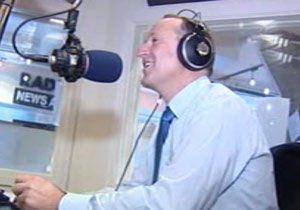
AUCKLAND (New Zealand Herald/Pacific Media Watch): It should not have taken the police more than three months to decide no charges should be laid in the so-called "teapot tapes" affair.
From the beginning, when the Prime Minister and Act candidate John Banks were inadvertently recorded at a stage-managed photo opportunity during the election campaign, it was clear no crime had been committed.
The cameraman who left his device - and yes, it was unusual that it was in its little black bag - did so by accident in a media scrum. Only after he realised it had been taken by the Prime Minister's staff, who would not return it, did he discuss the fact of the recording with the Herald on Sunday newspaper. That paper considered the contents, sought permission to publish from the participants in the conversation and did not do so when that permission was withheld. End of story.
No crime committed
No crime had been committed, despite the police attempt yesterday to save face by claiming the cameraman's action was "unlawful" or, in a telling show of doubt, "at least reckless". The lawfulness would have been for a court to decide, but no prosecution will be taken.
The Herald on Sunday, the sister paper to the New Zealand Herald, had precisely no involvement in the act of accidental recording, nor did it publish the material recorded, after careful journalistic and ethical consideration.
It reported the fact of the tape's existence and hinted in the broadest manner of the controversies within.
It suited the political times, or so Mr Key's advisers thought, to turn this into a sprawling week of allegations against the media. We were, predictably and unimaginatively, likened to the News of the World, the UK tabloid closed after hacking a murdered girl's mobile phone, among many other outrages. Then, Mr Key claimed we would publish parents' private discussions of suicidal children. And when those preposterous attacks fell flat, he shrugged that the police had time to investigate this case because National had lowered the crime rate.
Police delay
As it happens, the police took months to locate those who also drank coffee near the two politicians that day, to take pro-forma statements from a range of news photographers and journalists - including one whom they didn't realise had stayed inside the cafe drinking coffee because he considered it a public place - and to work out a way to let the whole sorry mess drop without further embarrassment.
So a letter from the cameraman, Bradley Ambrose, to the two politicians expressing regret and explaining he meant no harm to them or himself was considered adequate contrition and the Prime Minister agreed with prosecutors that that should be that. The letter was consistent with Ambrose's sworn evidence in a court action he took at the time.
The police announcement conveniently coincided with Mr Key being in Korea, responding through a brief press release. He noted the police claim the cameraman's actions were "unlawful" but even he could not try to make much out of this sorry business. He did not believe a prosecution was "now necessary" and thought all could now move on.
'Misgiuded mission'
Sadly, that should have been his view at the time. It was a stance he seemed incapable of adopting because of a misguided mission to stop what he imagined to be a "slippery slope" of media intrusion. There is no slope, slippery or otherwise, in the coverage of political or public affairs.
There is a slippery slope, however, in police inquiries arising from political discomfort. As the police walked away yesterday, there was an unnecessary but chilling sting in the tail. The warning to Ambrose "sends a clear message to media that the recording and distribution of conversations that are considered private is likely to lead to prosecution in the future". But "considered" by whom?

This work is licensed under a Creative Commons Attribution-NonCommercial 3.0 New Zealand Licence.



